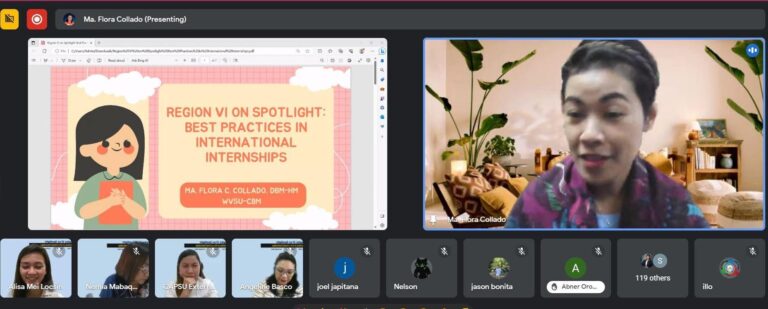West Visayas State University (WVSU) headed a virtual discussion to shed light on the best practices of the state universities and colleges in Region VI on October 18, 2023. The partner state universities were Iloilo Science and Technology University (ISAT U), Capiz State University (CAPSU), and Guimaras State University (GSU). Tarlac Agricultural University (TAU), though not in Region 6, served as guest partner.
Called as Region VI on Spotlight: Best Practices in International Internships, the activity tackled what works in a state university, procedures/protocols, and best practices.
WVSU President Dr. Joselito Villaruz welcomed the participants, “Today shows the untiring efforts of internationalization, where barriers of competition and exclusivity among state universities are broken and we welcome the spirit of unity by the sharing of the best practices in international internships.”
The presenters were Dr. Marien Laureto, Director-International and National Affairs of CAPSU, Dr. Joel Japitana, Director-International Affairs and External Linkages of GSU, Mrs. Angeline Basco, National and International Coordinator of the College of Industrial Technology of ISAT U, and Dr. Ma. Flora C. Collado, Chair-Division of Hospitality Management of WVSU.
The discussions with the four universities in Region 6 revolved around the following points: in the era of Internationalization, student internships abroad are conscious efforts , though voluntary, for learners to be able to not only learn academically and put into practice the theories they were taught, but also to immerse them into cultures different from theirs-making them globally competitive and developing in them global citizenship. However, the internships must undergo procedures properly—there should be an existing memorandum of understanding or memorandum of agreement between the sending school and the host school abroad with the internship plan approved by the Vice President for Academic Affairs and the University President.
Issues regarding financial subsidy to outbound students were also brought up, discovering that each university has different practices. Dr. Nemia Mabaquiao, the Vice President for External Affairs of ISAT U said that “while we spend for our foreign students, we should also spend for our own” to support international internship or exchange.
Ms. Edel Carmela Subong-Csoka, Director of the International and Local Linkages Office of WVSU stressed that in international internships, “We think more of what is best for our students, what protects them, and what benefits the universities in the Philippines in return.”
Dr. Christine Nabor-Ferrer, Director IV of Commission on Higher Education Region I (CHEDRO1) expressed her support to this endeavor in Region VI and also shared the process on how to go about international internships. Dr. Ferrer was the Director for External Linkages and International Affairs of Tarlac Agricultural University before she was appointed Regional Director of CHEDRO1. She is considered as one of the mentors in internationalization in the Philippines.
The event closed with remarks from the TAU’s Acting Director of External Linkages and International Affairs Prof. Marlon Espedillon, “In any internationalization activity, it is imperative that we understand the quintessential reasons why we are sending our students abroad. Is it for competencies? Is it for our institution profile?… It is the learning processes and the ecological context that may significantly influence the internship experience. Hence, the need for this dialogue. I am thankful that we have this kind of forum… “
The event was participated by more or less 130 faculty, students, and staff.
